Customer care is an element of every business’s success, directly impacting customer retention, brand loyalty, and overall reputation. Each customer interaction carries weight in a competitive market, potentially influencing a company’s trajectory.
This guide discusses the foundations of customer care, core service components, leveraging customer care technology for a positive customer experience, building a high-performing service team, crafting positive experiences, and harnessing the power of personalization. It also covers understanding the myriad benefits of excellent customer care service.
The foundation of customer care
Customer care is a cornerstone for cultivating long-term customer relationships. It goes beyond simply handling issues or transactions — it involves creating meaningful emotional connections, understanding customer needs, and offering tailored support that aligns with their expectations.
Every interaction is essential in a market with fierce competition and abundant customer choices. A negative experience can significantly impact a company’s reputation and success, while consistently positive interactions can build a loyal customer base. Customer care ensures that every touchpoint, from initial inquiries to post-sale support, is handled with care, empathy, and professionalism.
Build strong customer relationships. ✅ Join HelpDesk and resolve customer inquiries within minutes. ⌚
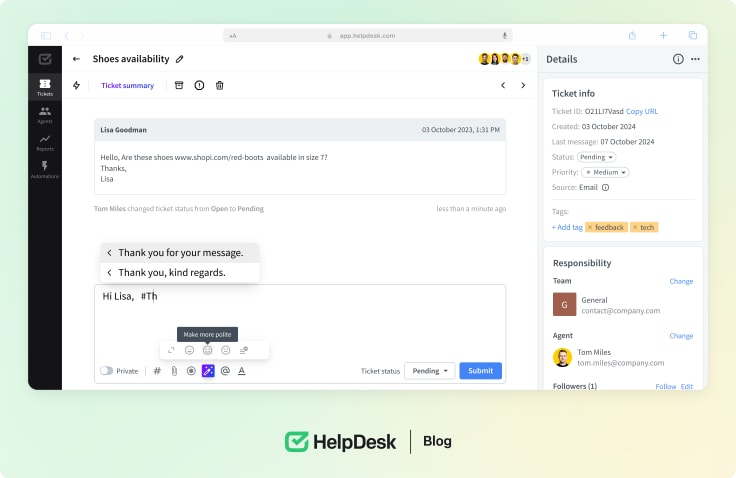
Core components of customer care
Customer care comprises several core components that contribute to a superior customer experience.
At its core, excellent customer care builds trust and strengthens relationships between a business and its customers. When customers feel heard, understood, and valued, they are likelier to continue working with a company.
Happy customers are also more inclined to recommend a brand to others, generating positive word-of-mouth referrals, which are invaluable today. Implementing core components such as active listening, empathy, timely responses, and personalized communication addresses customer needs and reduces the likelihood of negative experiences that can damage a company’s reputation.
In an era where social media and online reviews can make or break a business, maintaining a high standard of customer care is essential for managing public perception and safeguarding the company’s image.
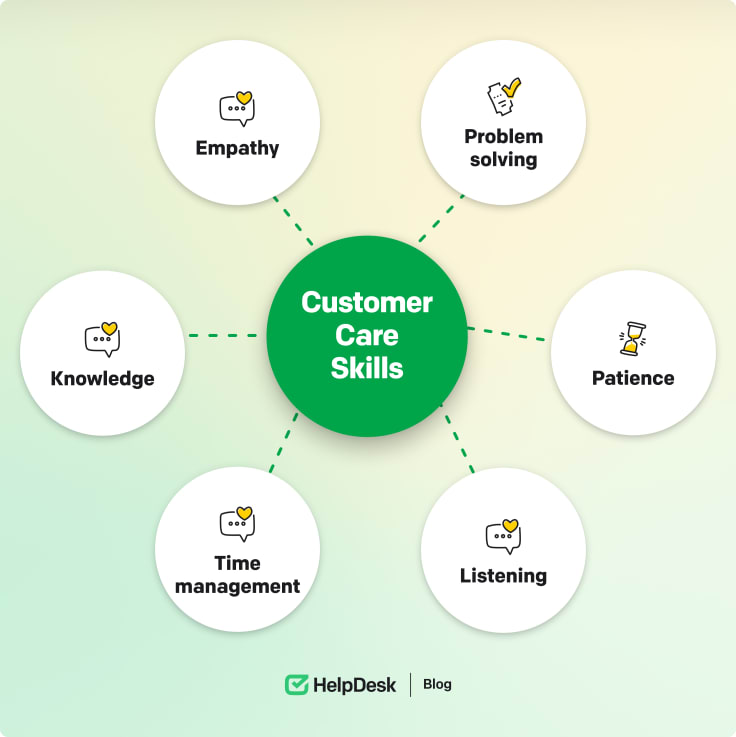
Comprehensive coverage
Comprehensive customer care involves addressing all aspects of the post-sale experience, including support, assistance, and maintenance. Every customer journey phase must be managed carefully, from answering questions and troubleshooting issues to providing ongoing support.
It covers:
-
Pre-sale support: Addressing inquiries and providing information to assist decision-making.
-
Post-sale assistance: Helping customers with product usage, handling returns or exchanges, and resolving issues.
-
Ongoing maintenance: Ensuring continued customer satisfaction levels through regular updates and support.
Digital and direct interactions
Customer care spans both digital and direct channels. Digital channels include FAQs, a self-service portal, and chatbots, which empower customers to find solutions independently. Direct interactions involve personalized self-service options through phone, email, and live chat, offering more nuanced problem-solving.
Integrate asynchronous communication with a real-time solution. Check the HelpDesk and LiveChat integration for a better customer experience 🤝
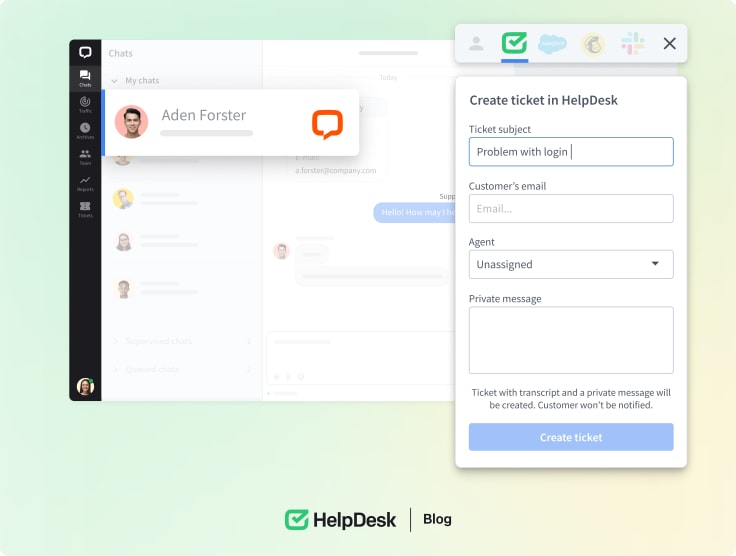
Essential qualities
Key qualities include empathy, active listening, and problem-solving skills. Empathy involves understanding the customer’s feelings and relating to the customer’s situation, while active listening ensures that agents fully comprehend the customer’s needs. Problem-solving solid abilities allow agents to address issues, leading to a more satisfying experience.
Focusing on these customer care principles can lead to operational perfection. Promptly resolving issues can help companies reduce the volume of repeat inquiries and complaints, leading to lower customer service costs and more satisfied customers.
Furthermore, investing in continuous training and development for customer care teams ensures that employees are well-prepared to listen to customer messages and handle diverse customer concerns, enhancing their confidence and job satisfaction. This, in turn, reduces employee turnover and promotes a positive working environment. Ultimately, by adhering to the core components of customer care, companies improve loyalty and create a sustainable competitive advantage, fostering long-term growth and profitability.
HelpDesk understands the interconnection between customer care and customer relations and can support your business to guarantee customer satisfaction. 🚀Check it now!
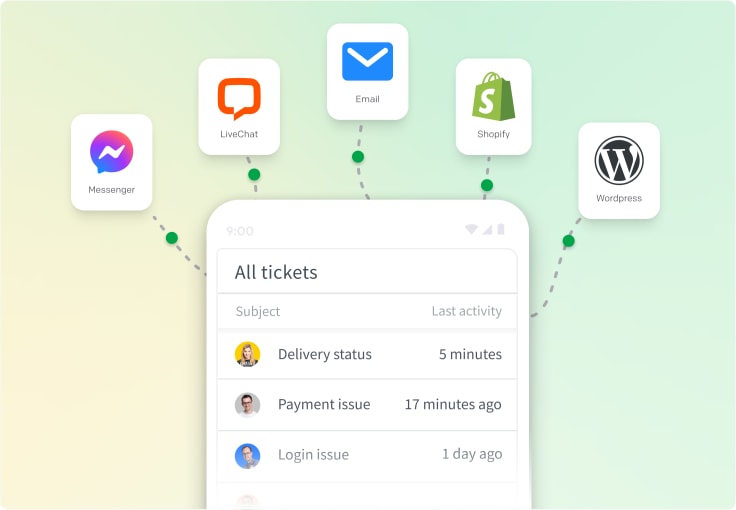
Harnessing technology to enhance customer experience
Automated systems like chatbots and AI-powered virtual assistants respond immediately to customer inquiries, handling common questions and issues around the clock without human intervention. It improves response times and frees the customer service representative to focus on more complex or sensitive issues requiring personal attention. Customer relationship management (CRM) systems also streamline the tracking and management of the customer service experience, ensuring that customer care representatives have all relevant information at their fingertips to provide personalized and consistent service.
Technology enables communication through multiple channels, such as email, social media, and mobile apps, allowing customers to reach out most conveniently. Advanced data analytics tools can provide deeper insights into customer behavior and preferences, enabling companies to anticipate needs, tailor their services, and proactively address potential issues before they arise.
Moreover, cloud-based platforms ensure the customer service team can access the tools they need from anywhere, facilitating remote work and global collaboration.
Artificial intelligence (AI) and natural language processing (NLP)
AI has become increasingly vital in managing and improving the customer service experience. AI tools use NLP to understand and process customer queries, enabling more accurate and personalized responses. Such technology can interpret customer intent and provide relevant information or solutions, enhancing the overall service experience.
Automation
Automation plays a significant role in streamlining customer care processes. It helps manage routine tasks such as ticket routing, common query responses, and issue tracking. By automating these repetitive tasks, human agents can focus on resolving more complex issues, improving the overall quality and efficiency of support operations.
HelpDesk can automate repetitive tasks such as ticket routing, prioritization, and status updates. This automation ensures that customer queries are directed to the correct department or customer service agent, reducing response times and enhancing the efficiency of the support operation. It can use automation to quickly answer frequently asked questions, freeing agents to focus on more complex issues.
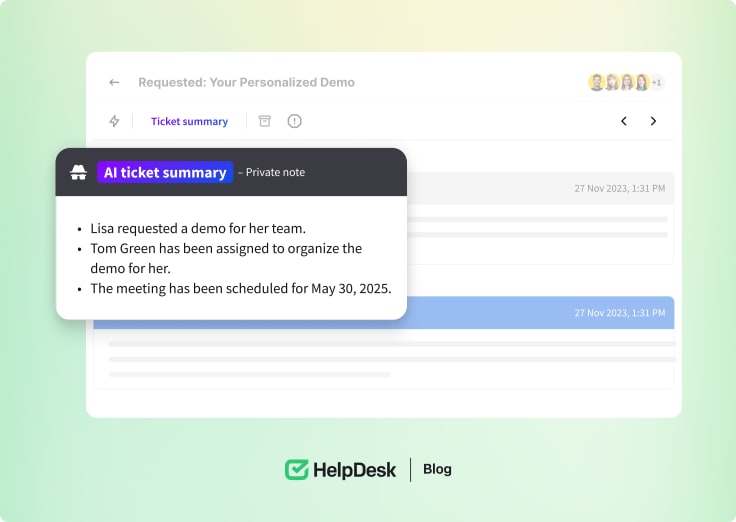
Building a high-performing customer care team
A customer care team is the backbone of excellent customer service delivery. Building and maintaining such a team involves several key strategies.
Key attributes
A high-performing customer care team should embody empathy, friendliness, and alignment with the company’s values. Empathetic agents understand and relate to customer concerns, while friendly interactions create a positive atmosphere. Aligning with company values ensures that every customer interaction reflects the brand’s ethos and commitment to quality service.
Empowerment and decision-making
Empowering customer service representatives to make customer-centric decisions is crucial. When customer care agents are given the authority to resolve issues and make decisions that benefit the customer, it fosters a sense of ownership and accountability.
For example, HelpDesk enables communication through various channels such as email, chat, contact forms, and social media. This flexibility ensures that customers can reach out using their preferred method, which enhances the overall customer experience.
For the support team, asynchronous communication allows for better time management, as agents can handle multiple cases concurrently without the pressure of an immediate response, thus maintaining clarity and transparency throughout the communication process. In HelpDesk, you can use followers or people in the loop to keep everyone updated on necessary details. Learn how to use them!

Training and development
Ongoing training is essential for updating the team on new tools, technologies, and best practices. Regular training sessions help agents stay informed and improve their skills. Additionally, recognizing and rewarding exceptional performance boosts morale and encourages a high standard of service. Creating a supportive work environment where agents feel valued and equipped to handle their responsibilities is key to maintaining a motivated and capable team.
Take our Customer Support course to enhance your team's abilities to deliver exceptional customer care. 🚀

Crafting a positive customer experience
Creating a positive customer experience requires deeply understanding of customer needs and preferences. By carefully gathering and analyzing customer data, you can gain valuable insights into what customers value most, their pain points, and their behavior patterns. This knowledge allows companies to customize their offerings and customer service strategies to match customers’ needs. For example, knowing which communication channels a customer prefers—phone, email, or social media—allows one to engage with them more personally.
Understanding customer satisfaction
A thorough understanding of customer needs is essential for crafting a positive experience. Leveraging data-driven insights can help identify customer pain points and preferences. Tools like CRM systems track and manage customer interactions, providing valuable information that can be used to personalize and improve service.
Quality interactions
It’s crucial to prioritize quality interactions over quantity. Each customer touchpoint should be meaningful and add value. Empowering agents to take ownership of customer issues fosters a culture of accountability, leading to resolutions and a better customer experience. Resolving issues quickly is at the heart of any customer support system.
By organizing all interactions in a single interface, HelpDesk ensures that support teams can easily access customer communications history, understand each case’s context, and provide appropriate solutions. Whether troubleshooting technical issues, providing technical support, or answering product-related questions, HelpDesk equips agents with the tools they need to handle many customer concerns.
Proactive outreach
Proactive outreach is another effective strategy. By anticipating customer needs and reaching out with assistance or information before a problem arises, you can enhance the customer experience and demonstrate a commitment to customer success.
HelpDesk can facilitate proactive outreach by enabling customer success teams to offer timely support and ensure customers are maximizing the value of the product or service. HelpDesk can monitor customer behavior and identify opportunities for proactive engagement, such as offering assistance before customers realize they need it or reaching out with personalized recommendations based on past interactions.
The power of personalization in customer care
Personalization is a powerful tool for building customer loyalty and enhancing customer care. By tailoring interactions and communications to individual preferences, companies can demonstrate that they understand and value each customer’s unique needs and interests. This level of attention fosters a sense of loyalty and trust, making customers feel more appreciated and valued.
Personalized customer interactions can range from addressing customers by their names in communications to recommending products or services based on past purchases or browsing history. These tailored interactions improve customer care and increase the likelihood of repeat business.
Personalization enhances customer care by making interactions more relevant and efficient. When customers feel like a company knows them and understands their preferences, they are more likely to engage and provide feedback, which can further refine the personalization process. This continuous loop of personalized service and customer feedback helps you create more targeted marketing strategies, anticipate customer needs, and proactively address potential issues.
Learn more about customer feedback in our Learning Space lesson: How To Get Customer Feedback and Measure Satisfaction. 🔥
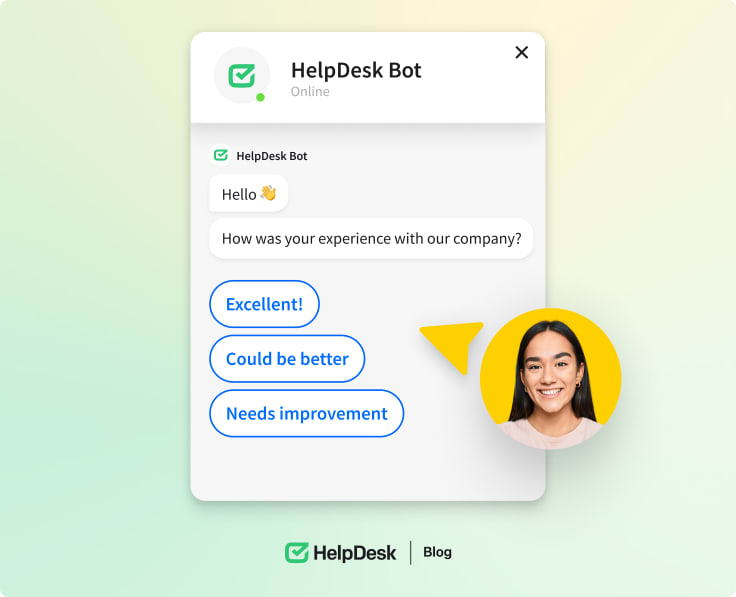
Creating emotional connection
Personalization helps create emotional connections between the brand and its customers. You can tailor interactions based on individual preferences and history to make customers feel valued and understood. Personalized experiences lead to increased customer care and loyalty. When a company anticipates a customer’s preferences or remembers past interactions, it demonstrates attentiveness and care that fosters deeper customer relations. This emotional connection encourages repeat business and enhances the likelihood of positive word-of-mouth referrals.
Human interaction
Despite technological advancements, human interaction remains crucial for personalization. Empathetic, customized support provided by human agents ensures that customers feel genuinely cared for. While AI can assist in understanding and processing queries, the human touch is essential for delivering a truly personalized experience.
The benefits of exceptional customer care
Exceptional customer care yields numerous benefits that can drive business success and growth. At its core, superior customer care fosters strong customer relations, which leads to increased satisfaction and loyalty. Satisfied customers are more likely to become repeat buyers, reducing customer churn and increasing lifetime value.
Increased loyalty and retention
One of the most significant benefits of exceptional customer care is increased customer loyalty and retention. Satisfied customers are more likely to return and engage in repeat business. You can consistently deliver high-quality service to build strong, long-term customer relationships, reduce churn rates, and enhance customer retention.
Enhanced brand reputation
Positive customer experiences lead to favorable word-of-mouth recommendations, significantly boosting a brand’s reputation. A strong reputation for delivering excellent customer care in a competitive market provides a crucial competitive edge. Customers are more likely to trust and engage with a brand known for its commitment to customer care, making it easier for companies to build and maintain a loyal customer base.
An enhanced brand reputation can open doors to new business opportunities, partnerships, and collaborations, as other companies and stakeholders prefer to associate themselves with a well-regarded you in the eyes of consumers. A positive reputation also provides a buffer in times of crisis or negative feedback — customers are more likely to give the benefit of the doubt to a company known for exceptional service.
Business growth
Exceptional customer care can drive business growth by increasing customer lifetime value. Loyal customers tend to contribute more over time, providing a steady source of revenue. Additionally, superior customer care helps stabilize revenue by reducing churn rates and fostering stronger customer relationships.
Positive outcomes
The positive outcomes of exceptional customer care include increased customer satisfaction and loyalty and a more robust overall business performance. By investing in customer care, you can grow, improve your brand’s standing, and create a sustainable competitive advantage.
Summary
Exceptional customer care is crucial for achieving business success and growth. You can significantly improve customer interactions by understanding the key components of customer care, using technology, building a high-performing customer service team, creating positive experiences, and personalizing their approach. Investing in customer care leads to increased satisfaction, loyalty, and retention, ultimately driving growth and improving brand reputation.
Platforms like HelpDesk offer comprehensive solutions to streamline and enhance customer care operations. Features like ticket management, issue resolution, asynchronous communication, automation, feedback collection, and proactive outreach help you manage and improve customer interactions. Embracing these strategies and tools will help you achieve excellence in customer care and foster continued success and growth.


